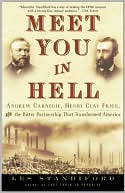List Books » Meet You in Hell: Andrew Carnegie, Henry Clay Frick, and the Bitter Partnership That Transformed America
Category Books
- Fiction Books & Literature
- Graphic Novels
- Horror
- Mystery & Crime
- Poetry
- Romance Books
- Science Fiction & Fantasy
- Thrillers
- Westerns
- Ages 0-2
- Ages 3-5
- Ages 6-8
- Ages 9-12
- Teens
- Children's Books
- African Americans
- Antiques & Collectibles
- Art, Architecture & Photography
- Bibles & Bible Studies
- Biography
- Business Books
- Christianity
- Computer Books & Technology Books
- Cookbooks, Food & Wine
- Crafts & Hobbies Books
- Education & Teaching
- Engineering
- Entertainment
- Foreign Languages
- Game Books
- Gay & Lesbian
- Health Books, Diet & Fitness Books
- History
- Home & Garden
- Humor Books
- Judaism & Judaica
- Law
- Medical Books
- New Age & Spirituality
- Nonfiction
- Parenting & Family
- Pets
- Philosophy
- Political Books & Current Events Books
- Psychology & Psychotherapy
- Reference
- Religion Books
- Science & Nature
- Self Improvement
- Sex & Relationships
- Social Sciences
- Sports & Adventure
- Study Guides & Test Prep
- Travel
- True Crime
- Weddings
- Women's Studies
Meet You in Hell: Andrew Carnegie, Henry Clay Frick, and the Bitter Partnership That Transformed America » (Reprint)

Authors: Les Standiford
ISBN-13: 9781400047680, ISBN-10: 1400047684
Format: Paperback
Publisher: Crown Publishing Group
Date Published: June 2006
Edition: Reprint
Author Biography: Les Standiford
Les Standiford is best known for his series of hard-boiled detective capers starring tough guy John Deal -- a hero the legendary James Ellroy once called "the unassailable new kingpin of the South Florida crime novel." Perhaps one of the only popular crime writers today with a Ph.D. in creative writing, Standiford leads the writing program at Florida International University in between books.
Book Synopsis
Two founding fathers of American industry.One desire to dominate business at any price.
The author of Last Train to Paradise tells the riveting story of Andrew Carnegie, Henry Clay Frick, and the bloody steelworkers’ strike that transformed their fabled partnership into a furious rivalry. Set against the backdrop of the Gilded Age, Meet You in Hell captures the majesty and danger of steel manufacturing, the rough-and-tumble of the business world, and the fraught relationship between “the world’s richest man” and the ruthless coke magnate to whom he entrusted his companies. The result is an extraordinary work of popular history.
Also available as a Random House AudioBook and an eBook
Kirkus Reviews
Life lesson number one for a would-be robber baron: Don't cross Andrew Carnegie. Prolific genre novelist Standiford (Havana Run, 2003, etc.) turns to fact to portray the fraught partnership of steelmaker Carnegie and Henry Frick, supplier of industrial coke to the world. Frick was a tough dealer, but Carnegie was tougher; when the coke producers of Pittsburgh agreed to fix a price of $1.50 per ton for the stuff, Carnegie countered that he would pay Frick $1.15 a ton, "and there would be no further discussion of the matter." Frick became the lesser of equals as the chairman of Carnegie Steel and enjoyed considerable freedom of movement as Carnegie spent more and more of his later life in his native Scotland and left routine administration to Frick and Carnegie Steel president Charles Schwab. Indeed, Frick orchestrated Carnegie Steel's response to the Homestead Strike of 1892; although Carnegie was doubtless troubled by the hired strikebreakers' brutality, "the fact is that he had chosen to absent himself from Homestead when he was well aware of what was coming." For his trouble, Frick was nearly assassinated by the anarchist Alexander Berkman, who shot and stabbed him. When he recovered, Frick busied himself pushing out executives whom he felt insufficiently served his interests, including the superintendent of the Homestead plant. For various reasons, Carnegie and Frick, never fond of each other, began to develop a serious mutual dislike; as Standiford writes, plots thickened as Carnegie looked for ways to force Frick out while Frick, it appears, tried to leverage the company in what Carnegie regarded as "a despicable exercise in speculation." Frick remained a member of the board whenCarnegie sold out to Andrew Mellon, but he seems to have dedicated his later years to one-upping Carnegie's charitable work (" 'I'm going to make Carnegie's place look like a miner's shack,' Frick told friends") and otherwise spreading poison about the old man. Sometimes a little too breezy, but Standiford's glimpse into the greed-is-good Gilded Age will interest business-history buffs. Author tour
Table of Contents
Subjects
 Business Biography
Business Biography  Business Biography - Specific Individuals
Business Biography - Specific IndividualsBiography
 Business Biography
Business Biography  Capitalists & Financiers - Biography
Capitalists & Financiers - BiographyBiography
 Business Biography
Business Biography  Industrialists - Biography
Industrialists - BiographyBiography
 All Biography
All Biography  Business Biography
Business BiographyBusiness Books
 Business Biography
Business Biography  Business Biography - Specific Individuals
Business Biography - Specific IndividualsBusiness Books
 Business Biography
Business Biography  Capitalists & Financiers - Biography
Capitalists & Financiers - BiographyBusiness Books
 Business Biography
Business Biography  Industrialists - Biography
Industrialists - BiographyBusiness Books
 Business History
Business History  Basic Materials Industries - History
Basic Materials Industries - HistoryHistory
 American History
American History  United States History - General & Miscellaneous
United States History - General & MiscellaneousNonfiction
 All Nonfiction
All Nonfiction  Business Biography
Business BiographyNonfiction
 Biography
Biography  Business Biography
Business BiographyNonfiction
 Biography
Biography  All Biography
All BiographyNonfiction
 History
History  American History
American History
